(6) Actions on the Environment and Climate Change
The environment and climate change issues, addressed in the SDGs, are critical time-sensitive challenges that the international community must work together on, with the occurrence of extreme weather events and devastating natural disasters in recent years. Japan has vigorously worked on addressing these issues and provided assistance to developing countries through the Global Environment Facility (GEF), Glossary a financing mechanism for major international environmental treaties such as the Convention on Biological Diversity and the United Nations Framework Convention on Climate Change (UNFCCC), as the world’s top donor.
● Japan’s Efforts
■ Conservation of the Marine Environment
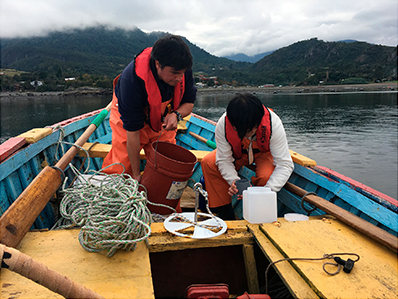
A researcher and a local counterpart sampling seawater in red tide areas in Chile (Photo: JICA)
Marine plastic litter is a pressing issue that can have an adverse impact on the marine ecosystem, tourism, fisheries, and human health. It has become important to take measures to address this issue in recent years. As of December 2022, 87 countries and regions have shared the “Osaka Blue Ocean Vision,” an initiative led by Japan at the G20 Osaka Summit in 2019 that aims to reduce additional pollution by marine plastic litter to zero by 2050. In order to realize the Vision, Japan launched the “MARINE Initiative” that focuses on (i) Management of wastes, (ii) Recovery of marine litter, (iii) Innovation, and (iv) Empowerment. Under the Initiative, Japan supports capacity building and infrastructure development for waste management in developing countries in order to promote effective measures against marine plastic litter worldwide.
Japan supports marine plastic countermeasures through the UN Environment Programme (UNEP). In the “CounterMEASURE II” project, to which Japan contributed 627 million yen, UNEP has established an expert group in Southeast Asia and India, supported the group in building scientific knowledge, and conducted training for more than 2,000 people since March 2020. In response to the worsening marine pollution caused by plastic waste, UNEP also developed a method for monitoring the flow of plastic waste into the ocean. In addition, to enable science-based policymaking, UNEP conducts sampling surveys of plastic litter and scientific analysis on its pathways and formulates policy recommendations and guidelines based on the results. Furthermore, in collaboration with a Japanese IT company, a plastic leakage hotspot map was created, identifying approximately 3,000 leakage points (hotspots), and released on a dedicated website Note 76 available to the general public.
Moreover, as part of expanded assistance for ASEAN to address marine plastic litter issues, which was announced at the ASEAN-Japan Summit in 2018, Japan provides capacity building support and conducts awareness-raising and PR activities for environmental conservation, primarily on reducing marine plastic litter in ASEAN countries since 2019.
For example, in 2022, through the Japan-ASEAN Integration Fund (JAIF), Note 77 Japan provided assistance to strengthen capacity for marine litter reduction through the formulation of national action plans in ASEAN countries, to strengthen capacity development of local governments in ASEAN to tackle microplastics and water pollution, and to build capacity for monitoring and reduction of marine litter from fisheries. Regarding ODA projects, from October to December 2022, both online and in-person training in Japan were held, with 13 participants from Cambodia, Indonesia, Malaysia, the Philippines, Thailand, and Viet Nam. The participants learned about the global trends in discussions and Japan’s efforts regarding measures against marine litter. In February 2022, collaborating with the United Nations Industrial Development Organization (UNIDO), Japan decided to provide support to Nigeria, which works to formulate measures for plastic waste management. Japan’s support includes assistance in the formulation of guidelines for managing plastic waste, the provision of equipment to promote recycling, and the training to improve capacity, focusing on the Federal Capital Territory (especially Abuja) and Lagos State in the country.
■ Conservation of Marine Resources
In the ASEAN region, Japan conducts training and workshops on countermeasures against illegal, unreported, and unregulated (IUU) fishing through JICA in cooperation with the Southeast Asian Fisheries Development Center (SEAFDEC). Curbing the impact on fish ecosystems affected by IUU fishing that exceeds regulatory thresholds leads to supporting the sustainability of the fishing industry, one of the core industries for ASEAN countries, and the sustainable development of fishing communities.
■ Climate Change
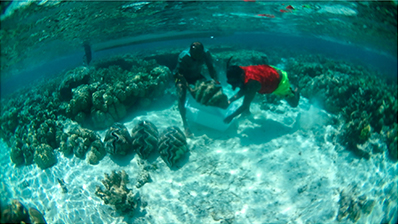
Members of the communities’ Resources Management Committees working to protect marine resources in Vanuatu. Japan has been implementing the “Project for Promotion of the Grace of the Sea in Coastal Village in Vanuatu” for over 10 years. (Photo: JICA)
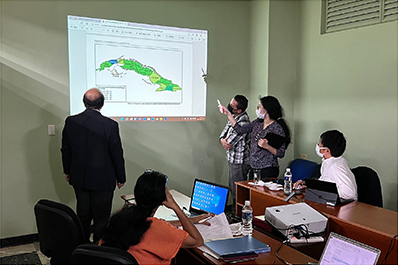
A meeting on the formulation of an electricity sector master plan for the development of renewable energy in Cuba (Photo: JICA)
The issue of climate change is a global challenge that should be addressed beyond national borders, and requires concerted efforts by the international community, including not only developed countries but also developing countries, to strengthen their efforts. “The Paris Agreement” was adopted at the 21st Session of the Conference of the Parties to the UNFCCC (COP21) held in 2015, as a framework under which all countries would work toward greenhouse gas (GHG) emission reductions. “The Paris Agreement” entered into force in 2016.
In October 2020, Japan declared that it would achieve net-zero GHG emissions by 2050. In April 2021, Japan also declared its aim to reduce its GHG emissions by 46% in FY2030 from its FY2013 levels, and to continue strenuous efforts in its challenge to meet the lofty goal of cutting its emissions by 50%. In October 2021, Japan submitted its “Nationally Determined Contribution (NDC)” Note 78 reflecting these goals, together with “The Long-term Strategy under the Paris Agreement” to the UN (see “Master Techniques from Japan to the World 1” for Japan’s efforts in relation to net-zero GHG emissions).
Japan expressed at COP26 held in 2021 that it would further provide up to 10 billion US dollars in both public and private finance over a five-year period, in addition to the assistance totaling 6.5 trillion yen in both public and private finance over five years from 2021 to 2025, already announced at the G7 Cornwall Summit in June 2021. Japan also announced the doubling of the amount of assistance for adaptation to climate change to 1.6 trillion yen over five years.
From November 6 to 20, 2022, COP27 was held in Sharm el-Sheikh, Egypt. COP27 focused on strengthening the implementation of climate actions as the session was called the “Implementation COP” built on the outcome of COP26 in November 2021. The cover decision of COP27, the “Sharm el-Sheikh Implementation Plan,” calling on Parties to strengthen their actions in each area of climate change, and the “Mitigation Work Programme” to urgently scale up mitigation ambition and implementation toward 2030, were adopted. Moreover, a decision was adopted to establish new funding arrangements, including a fund to assist particularly vulnerable developing countries in responding to loss and damage associated with the adverse effects of climate change.
The “Just Energy Transition Partnership (JETP),” which was launched at COP26 by France, Germany, the United Kingdom, the United States, and the EU to support South Africa, expanded its target countries to India, Indonesia, Viet Nam, and Senegal at the G7 Elmau Summit in June 2022. Japan, together with the United States, has proceeded discussions as a co-lead country of the Indonesia JETP. On November 15, 2022, partner countries, including Japan and the United States, and Indonesia concurred and issued the Joint Statement on the Indonesia JETP, which supports Indonesia’s efforts in the transition from coal to renewable energy. In addition, on December 14, 2022, the International Partners Group including Japan, and Viet Nam agreed on the “Political Declaration on establishing the JETP with Viet Nam.”
Regarding multilateral support, Japan supports developing countries through its contribution to the “Green Climate Fund (GCF),” Glossary the world’s largest multilateral climate fund. Japan has pledged a total of up to 3 billion US dollars to the fund, putting effort into supporting countries vulnerable to the impacts of climate change as the fund’s second largest donor country. At the GCF, a total of 209 projects have been approved and implemented by December 2022, which in total are expected to reduce GHG emissions by 2.4 billion tons and increase the resilience of 680 million people through support for adaptation. Additionally, from Japan, JICA, MUFG Bank, and Sumitomo Mitsui Banking Corporation are approved as “Accredited Entities” that are entitled to propose GCF projects. To date, two projects by MUFG Bank have been approved; sustainable forestry project in seven countries in Sub-Saharan Africa and Latin America (March 2020) and assistance on climate bond issuance in developing countries (October 2022), along with two projects by JICA; Community-based Landscape Management for Enhanced Climate Resilience and Reduction of Deforestation in Critical Watersheds in Timor-Leste (March 2021) and Building Climate Resilient and Safer Islands in the Maldives (July 2021).
Furthermore, in order for the international community to achieve net-zero GHG emissions as a whole, Japan released “Japan’s Proposal on MDBs’ Support in the Energy Sector” at the annual meetings of the World Bank and IMF in October 2021. The proposal requests multilateral development banks (MDBs) to support developing countries in formulating and implementing ambitious energy plans, as well as to support the best projects from the perspective of reducing GHG emissions.
In line with the above proposal, Japan contributes to the Asian Development Bank’s (ADB) Energy Transition Mechanism (ETM), which supports the energy transition from coal-fired power generation in developing countries, and the Capital Market Mechanism of the Climate Investment Fund instituted at the World Bank. The launch of both mechanisms was announced at COP26, and efforts for implementation are currently underway at each institution.
As a specific example of bilateral assistance, Japan supports the establishment of the Pacific Climate Change Centre in Samoa to which Japan dispatches experts on climate change countermeasures. Through the Centre, Japan strives to develop human resources in the Pacific Island countries vulnerable to climate change (see “Project Introduction Column” regarding support for waste management in Pacific Island countries).
In relation to the African region, at TICAD 8 held in August 2022, Japan launched the Green Growth Initiative with Africa (GGA) with the goal of addressing climate change and transforming the energy structure toward decarbonization. Under this initiative, Japan aims to maximize its cooperation through three approaches; (i) ownership and co-creation, (ii) flexible finance mobilization, and (iii) collaboration with diverse partners, and promotes various efforts to contribute to the sustainable growth in Africa.
In regard to the support for the ASEAN region, Japan implements comprehensive cooperation for decarbonization transitions based on the “ASEAN-Japan Climate Change Action Agenda 2.0” announced by Prime Minister Kishida at the ASEAN-Japan Summit in 2021. As part of its assistance for climate change actions in developing countries, Japan promotes the “Joint Crediting Mechanism (JCM),” Glossary which facilitates the diffusion of advanced decarbonizing technologies to partner countries around the world including developing countries. This contributes to GHG emission reductions in partner countries, and helps Japan to achieve its own reduction targets as the emission reductions in developing countries can be credited as Japan’s reduction efforts. In 2013, Japan signed the first Memorandum of Cooperation (MOC) pertaining to the JCM implementation with Mongolia. Since then, Japan has established the JCM with 17 countries, and in 2022, it signed new MOCs with eight countries. As of the end of 2022, the JCM credits have been issued from 40 energy-saving and renewable energy projects in Cambodia, Indonesia, Laos, Mongolia, Thailand, Viet Nam, Bangladesh, Maldives, Palau, Saudi Arabia, and Kenya. These JCM projects contribute to GHG emission reductions worldwide.
Japan will continue to lead the international community toward the realization of a decarbonized society, which is the goal of the Paris Agreement.
Nine Pacific Island Countries Note 1
Environmental Conservation in Pacific Island Countries through Continuous Cooperation
Promotion of Regional Initiative on Solid Waste Management in Pacific Island Countries Phase 2 (J-PRISM 2)
Technical Cooperation Project (February 2017 – March 2023)
In the Pacific Island countries, the amount of waste is increasing due to lifestyle changes. There exist many challenges, however, in conducting appropriate waste management, owing to a lack of treatment facilities and human resources. In response to this situation, Japan provides various types of assistance related to waste management to the region, making the most of its accumulated knowledge and experience. In Phase 1 of this project, implemented from 2011 to 2016 targeting 11 Pacific Island countries, Japan supported the training of human resources engaged in waste management as well as the improvement of disposal sites in each country. Furthermore, Japan conducted Phase 2 from 2017 to further strengthen each country’s waste management systems, focusing on their strategy formulation and institutional capacity building.
In Vanuatu, one of the target countries, Japan had been supporting the development of the Bouffa Landfill on the outskirts of its capital city Port Vila, including the expansion of the landfill site, for more than 15 years since 2006. Building on the foundation laid by its continuous support, in Phase 2 of the project, Japan aimed to conserve the country’s environment, optimize waste management around Port Vila, and reduce illegal dumping and littering. To this end, Japan supported measures such as the implementation of the National Waste Management and Pollution Control Strategy (NWPCS), reinforcement of the monitoring capacity, formulation of the Port Vila Municipal Council Annual Solid Waste Management Plan (ASWMP), as well as the introduction of the Container Deposit Scheme (CDS).Note 2
As a result, core staff for waste management were appropriately assigned at both national and local levels, leading to resolving the human resources shortage. At the Bouffa Landfill, the waste management infrastructure has been strengthened by enabling municipal officers to maintain and manage the disposal site themselves through transferring Japan’s surveying techniques for calculating the disposal site capacity. In 2019, the Cabinet decision was made to accelerate the introduction of CDS, and necessary adjustments, including finalizing the bills for its introduction, are currently being made. With the introduction of CDS, which will enable resource recycling in Vanuatu, the amount of waste is expected to be reduced.
These efforts also help prevent the outflow of plastic waste into the ocean. Japan will continue to support sustainable and self-reliant waste management in the Pacific Island countries and contribute to environmental conservation.
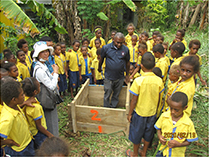
A city official from Port Vila and a JICA expert installing wooden composting frames at an elementary school and providing environmental education to children (Photo: JICA)
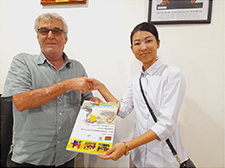
A JICA expert handing over the completed Solid Waste Management Plan (2021-2030) to the Mayor of Port Vila (Photo: JICA)
Note 1: Fiji, Marshall Islands, Federated States of Micronesia, Palau, Papua New Guinea, Samoa, Solomon Islands, Tonga, and Vanuatu.
Note 2: CDS is a system in which a deposit is paid by the consumer when they buy canned or plastic-bottled drinks. The deposit is refunded when the cans or bottles are returned to a designated collection point for recycling.
■ Biodiversity
In recent years, expansion of human activities in scope, scale, and types has given rise to serious concerns about further degradation of habitats and the destruction of the ecosystem. Japan values biodiversity efforts, as seen in its initiative to hold the 10th Meeting of the Conference of the Parties to the Convention on Biological Diversity (CBD) Glossary (COP10) in Nagoya City, Aichi Prefecture in 2010. In addition, Japan makes contributions to the Japan Biodiversity Fund Note 79 to support the capacity building of developing countries. In December 2022, the second part of the 15th Meeting of the Conference of the Parties (COP15) was held in Montreal, Canada, and the “Kunming-Montreal Global Biodiversity Framework” was adopted as the new global goals and targets, replacing the Aichi Biodiversity Targets. Japan will continue to contribute in this field, aiming to realize the 2030 mission that is “to take urgent action to halt and reverse biodiversity loss to put nature on a path to recovery” and the 2050 Vision of “living in harmony with nature,” described in the framework.
Illegal trade of wildlife has also become an increasingly serious issue. The international community pays attention to this issue, as it has been one of the funding sources of international terrorist organizations. Japan actively contributes to the discussions at the Convention on International Trade in Endangered Species of Wild Fauna and Flora (CITES), and works on resolving the issue in cooperation with the international community through the contribution to projects implemented by the CITES Secretariat. Specifically, Japan supports the construction of facilities for implementing elephant poaching countermeasures, among other efforts.
■ Conservation of Tropical Forests
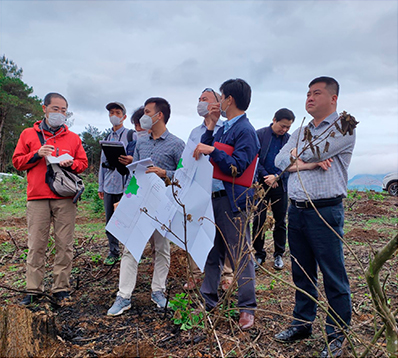
A JICA expert conducting a field survey with counterparts on a sustainable forest management plan in Son La Province, Viet Nam, in the “Project on Enhancing Sustainable Natural Resources Management Phase 2” (Photo: JICA)
Tropical forests account for approximately half of the world’s forests and play an important role in tackling climate change and conserving biodiversity. Japan invited the International Tropical Timber Organization (ITTO) to establish its headquarters in Yokohama, and has supported sustainable management of tropical forests as well as legal and sustainable tropical timber trade through the organization for more than 30 years. Through voluntary contributions to ITTO, Japan supported projects such as managing forest fires in the tropics, which have become more frequent and serious recently, in Indonesia and Peru between January 2021 and June 2022, building capacity for sustainable forest management in tropical timber producing countries, and developing a timber-tracking system to combat illegal logging. Through these projects, in Indonesia, training on fires for firefighting authorities was implemented and a new monitoring and reporting system was developed for fire prevention patrols, in addition to the enhancement of local stakeholders’ capacity. As for Peru, more than 200 volunteer firefighters were trained, and tools and platforms were established for training and capacity building in relation to forest fire prevention and response at the Peru’s National Forest and Wildlife Service (SERFOR).
■ Environmental Pollution Control Measures
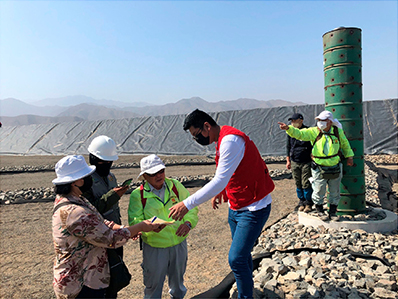
Guidance being given on the semi-aerobic landfill method (Fukuoka method) to staff of Peruvian Ministry of Environment and local public entities at the sanitary landfill site in Huaura Province, Peru. The Fukuoka method, a landfill disposal technology, was developed by Japan and is being introduced in Asia and Africa. (Photo: JICA)
In developing countries, regulatory controls on hazardous chemical materials are often not in place, which sometimes lead to environmental pollution and health damage. Japan possesses accumulated knowledge, experience, and technology related to environmental pollution control measures and utilizes them to solve environmental pollution problems in developing countries. Japan also conducts technical cooperation, such as dispatching experts to and accepting trainees from developing countries, in the areas of environmental management techniques in the chemical industry, analysis techniques and risk evaluation for environmentally hazardous substances, and chemical trace analysis techniques.
The “Minamata Convention on Mercury” was adopted at the Conference of Plenipotentiaries on the Minamata Convention on Mercury (2013) and entered into force in August 2017. Japan exercises continuous leadership in promoting the management of global mercury pollution by proactively transferring to the world its technology and know-how on preventing adverse effects caused by mercury, accumulated through its experience with the Minamata disease. In addition to conducting training to support Nepal and other countries in ratifying the convention, Japan conducted surveys in Indonesia and other countries to promote the international expansion of Japan’s excellent mercury management technology. Furthermore, from 2019, the UNEP Regional Office for Asia and the Pacific (UNEP/ROAP) as an implementing agency has been conducting the “Project for Promoting Minamata Convention on Mercury by making the most of Japan’s knowledge and experiences,” with Japan’s contribution. Through this project, Japan supports member states in improving the quantity and quality of domestic mercury-related information and developing a platform to implement mercury management in line with the Convention. The project utilizes the resources in and around Minamata City and technology possessed by Japanese institutions to design a comprehensive program to strengthen implementation capacity.
In the field of waste management, based on the “MARINE Initiative,” Japan announced to develop 10,000 officials engaging in waste management around the world by 2025 and trained approximately 17,000 officials by FY2022 through various means such as training programs.
Moreover, as a model project for waste management support in Africa under the “African Clean Cities Platform (ACCP),” Glossary Japan provides support for the Hulene final landfill site in Mozambique. At TICAD 8 held in August 2022, Japan announced that, under the ACCP, it would promote decarbonization and recycling in the waste sector, and improve public health including through waste management that benefits 30 million people in Africa, as well as to implement human resources development for 1,000 people. In Antananarivo, the capital city of Madagascar, a project is underway to improve equipment related to the collection, transportation, and final disposal of waste, with the aim of enhancing the city’s waste management capacity.
Glossary
- Global Environment Facility (GEF)
- A multilateral funding mechanism providing primarily grant-based financing for projects that contribute to global environmental conservation in developing countries. Having been established in 1991, 184 countries including Japan participate (as of January 2023). The World Bank manages the contributions from member countries. Through 18 implementing agencies including MDBs (World Bank, ADB, etc.) and UN organizations (UNDP, UNEP, etc.), it assists developing countries under five focal areas, namely biodiversity loss, climate change, international waters, land degradation, and chemicals and waste. It is designated as the financing mechanism to five international conventions: UNFCCC, CBD, UN Convention to Combat Desertification (UNCCD), Stockholm Convention on Persistent Organic Pollutants, and Minamata Convention on Mercury.
- Green Climate Fund (GCF)
- A multilateral climate fund established by the decision of COP16 (Cancun Agreement) in 2010, in order to support developing countries in reducing their GHGs (mitigation) and in their responses to the effects of climate change (adaptation).
- Joint Crediting Mechanism (JCM)
- A mechanism to evaluate contributions from Japan to GHG emission reductions or removals realized through the diffusion or implementation of leading decarbonizing technologies, products, systems, services, and infrastructure, etc., mainly in developing countries in a quantitative manner, and to use the contributions to achieve Japan’s NDC.
- Convention on Biological Diversity (CBD)
- A convention adopted in 1992 to advance global efforts to address biodiversity issues. The objectives of CBD are the following: (i) conservation of biological diversity, (ii) sustainable use of the components of biological diversity (utilizing living things, etc. for resources into the future while maintaining diversity at the levels of ecosystems, species, and genes), and (iii) fair and equitable sharing of the benefits arising from the utilization of genetic resources. Through the provision of economic and technical assistance to developing countries from developed countries, the international community as a whole facilitates the conservation and sustainable use of biological diversity worldwide.
- African Clean Cities Platform (ACCP)
- Established in 2017 by the Ministry of the Environment, Japan, together with JICA, the City of Yokohama, UNEP, and the UN Human Settlements Programme (UN-Habitat) aiming to share knowledge on waste management and promote the achievement of the SDGs in Africa. 160 cities in 43 countries in Africa have joined the Platform, holding plenary sessions, creating various guidelines and educational materials, planning study tours, and more.
- Note 76: “Mobile Application for Macro Plastic Survey” (https://arcg.is/1DOOWW)
- Note 77: See Note 4.
- Note 78: Parties set their GHG emission reduction targets and formulate measures to achieve them as NDC. It will then be submitted to the UNFCCC secretariat.
- Note 79: Established in the Secretariat of the CBD by Japan during its COP10 Presidency with the aim of building capacities in developing countries.
